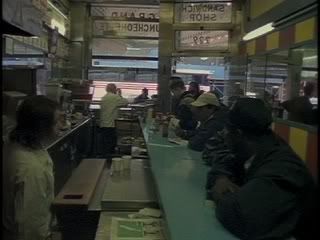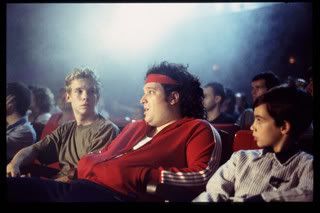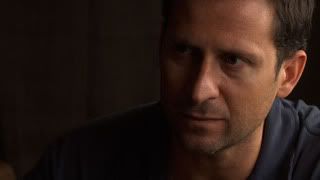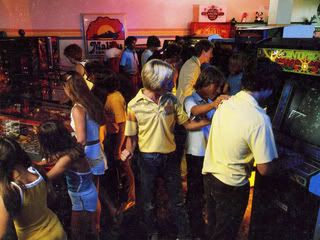
The New York United Film Festival kicked off at the Anthology Film Archives in New York City on December 15, 2007. NYUFF, an offshoot of the Tulsa United Film Festival, incorporated an eclectic group of shorts and features that ran the gamut from animation to horror to dark comedy. Although there was perhaps no readily apparent common ground between the films, festival director Jason Connell stressed his belief that what united the diverse selections was their potential to strike a nerve and resonate with the public- thereby warranting them the additional exposure and attention the festival could offer.
John F. O’Donnell and Matt Zaller hosted. The two had a great rapport and got things rolling with an off-the-cuff opening that mixed funny anecdotes, details on the fest and schwag giveaways. A small but keyed up audience was ready to check out what was looking to be a great program.
SHORT FILMS
The Seed
Directed By Joe Hahn

Half action film, half psychological drama, the Seed depicts the agonizing plight of a homeless veteran who is followed by unseen forces. Staggering by the banks of the L.A. River, Sung (Will Yun Lee) grapples with the mystery of what are seemingly his own inner demons.
Unexpected, disturbing images cut in to provide plenty of jumps and accentuate the torment Sung endures. The reasons behind Sung’s predicament are not entirely understandable- a shadowy character appears here and there with cryptic clues but for the most part, there is little to lay out exactly what’s going on here. If you can settle for getting the general gist of the plot (hint: it’s a bit Matrix-y), and take in the film for its strong points (visual effects, Lee’s convincing portrayal of the tortured main character and an especially striking climatic scene) The Seed is enjoyable. And undoubtedly, it makes the viewer reexamine the idea of the parameters of reality being necessarily determined by whether the majority of people can see it.
I Met the Walrus
Directed By Josh Raskin

In 1969, 14-year-old Jerry Lavitan managed to sneak into John Lennon’s hotel room for a chat, reel-to-reel in tow. Using the original interview recording as a soundtrack, Josh Raskin has crafted an enchanting animated film that is a must-see (and not just for the die-hard Lennon fans).
Though at first I attempted to jot down impressions, it wasn’t long before it became evident there was no way to fully take this piece in without being glued to the screen the entire time. One is left spellbound by the spectacle that is this continuous, blink-and-you’ll-miss-it flow of florid illustration which narrates Lennon’s responses to Lavitan’s questions (impressive inquiries at that, especially for a young man barely into his teens). At times laughter-inducing, and at times rather sobering, the film’s captivating imagery underscores Lennon’s viewpoints on social change that are still relevant in this day and age.
Validation
Directed By Kurt Kuenne

Even the most self-assured individuals look for outside approval to measure their worth at one time or another, and Validation explores this aspect of the human psyche in a fable about a parking lot attendant who validates customers- both literally and figuratively- with free parking and free compliments.
T.J. Thyne is delightful as Hugh New man, a man who is changing lives through his kindness. We can’t help but chuckle at his wide-eyed optimism and how it translates into positive reinforcement towards everyone he meets- especially since nearly every individual, no matter how world-weary, proves in the end to be a sucker for a compliment (comically represented by long lines of motley groups anxious to receive Hugh’s validation, who even burst into a musical number lauding Hugh!). His ability to dish out a sincere and eloquent compliment for anyone gains him notoriety, shown in amusing mock old-timey news reels (one bit has Hugh cut into a clip where he appears to be receiving a congratulatory handshake from George W. Bush). But just when it seems nothing can go wrong, he faces the hurdle of his magic having no effect on a woman he is strongly drawn to (at which point the film brilliantly sets the action at the DMV as a metaphor for utter joylessness). The upbeat feel takes a nosedive as the protagonist persistently, but unsuccessfully, strives to win over the object of his affection. Yet this is a fable, and so all is well in the end, with a somewhat schmaltzy but sweet plot twist that tugs at the heartstrings while tying up the loose ends. It’s what you might call a “feel good” film- perhaps not altogether realistic, but fun and uplifting. The smiling, happy world Hugh creates in which the defense mechanism of detachment is dropped, appreciation is shown and the good in others acknowledged seems like a nice place to be- and if there was a moral to this story, certainly the old adage of being able to capture more flies with honey than vinegar would tie in. Validated possesses the kind of message that’s needed to balance out the ever-increasing cynicism and self-absorption in our society- the message being of the mutual gain of simply showing appreciation and seeing the good in others. And of course, that it doesn’t hurt to smile now and then.
Grand Luncheonette
Directed By Peter Sillen

Telling the story of the last days of a 42nd Street hot dog lunch counter, Grand Luncheonette is testimony to the complete gentrification of the Times Square area.
The film illustrates one of these cases that is directly affected by the changing landscape of Manhattan, and follows what’s become something of a format when exposing the ills of “urban renewal”. You have your local mom-and-pop establishment that, through the years, has retained its individuality and distinct style. You’ve got your colorful cast of characters that keep things up and running, and we see them in action. Invariably, there’s always one eccentric standout that provides the requisite dose of comedy. We’re given the history of said small business- no doubt a business being steeped in tradition does something for its credibility- and there’s a little pathos thrown in there to gain our empathy for the doomed small business-owner.
Films like Grand Luncheonette need to be out there to remind the public of the effects of gentrification. It’s not that we don’t know it’s out there. We can’t help but notice the increasing McWalbucksization of metropolitan areas. But too often, in succumbing to its benefits (the major one being convenience), the public looks the other way and becomes desensitized to the very real consequences of the gentrification process- one being skyrocketing rental costs, which result in small businesses that give a neighborhood diversity and a local flavor (as well as being, in a sense, historical landmarks) being pushed out.
However, in following that standard recipe for gentrification awareness, Grand Luncheonette does not appear to contribute anything new to the subject matter. “Hey- gentrification- it’s happening! And here’s another example” will not suffice. To really hit home, we need a little more.
I longed for something to jump out, something new, something different to grab me by the collar and powerfully convey the consequences of this trend- a character that’s completely absorbing, an exceptional story, a twist on the editing- something . Instead, it seemed to blend in with so many others on the issue; and the concern is that if these types of films start blurring together as a well-intended but mushy portrait of rooting for the underdog, the public reaction could eventually end up being that same attitude of “we’ve gotten used to it” as the widespread problem they’re trying to address. Grand Luncheonette is utterly realistic and dignified in its understated tone- there’s no especially compelling personality, no overt emphasis on the tragic elements- maybe that’s how it really is. The owner merely accepts the reality of the situation and moves on. Unfortunately, this style may not be as effective in getting the point across. The film would perhaps work better if included in a feature made up of a series of vignettes focusing on the topic, rather than standing on its own. Nonetheless, the fact still is that it’s covering an important topic, which in itself makes the film one not to be dismissed and worth watching.
Mola Ser Malo (It’s Cool to Be Bad)
Directed By Alam Raja Verges

Mola Ser Malo is the narration of a young man (Fernando Ramallo) as he struggles with his vices and overcomes the obstacles that stand in the way of him attaining his dream girl and finding real fulfillment.
It almost sounds like your standard coming-of-age film of rebellious youth. And yet, it doesn’t make the obvious choices. For one, there’s an offbeat central theme of chicken, and the fact that at one point, the protagonist too easily gives up on the chase, reverting to his old ways and leaving us stumped as to how this will all pan out. The young man’s path has plenty of twists and turns; and this, with the narrator’s clever wit, vibrant cast (a mix of eccentric oddballs and extraordinarily attractive young people) and lightning fast pace amount to a highly entertaining watch.
Blow: A Public Service Announcement
Directed By Dick Thompson

Ever seen that show on Comedy Central, Robot Chicken? Like Robot Chicken? Then you’ll like Blow. Featuring a Barbie doll hooked on the yayo, Blow exposes the dangers of cocaine addiction to the tune of White Lines (of course) in a mock public service announcement (that- did I mention this?- looks a lot like Robot Chicken). Barbie gets progressively worse as her little dog (of course) looks on, making more and more of an embarrassment of herself right up to the cringe-worthy gross-out ending. It’s silly. It’s predictable. It’s juvenile. But it just goes to show that there will possibly always be something innately funny about taking a symbol of smug wholesomeness and altogether corrupting it. Barbie- she’s just like us!
Rest Stop for the Rare Individual
Directed By Roberto Bentivegna

Paul (A.J. Handegard) is having a hell of a time in acting class. George (Barnet Senegal) on the other hand, is doing wonderfully. The two get together after class, at which point George makes the suggestion of Paul temporarily taking his place for his side job. Paul is hesitant, but agrees- and finds himself on his way to the Chelsea Hotel to meet an older man. It goes without saying that he gets more life experience than he bargained for.
A tribute to the hotel? A jab at method acting? Unfortunately, the film’s objective is not altogether clear. However, the acting is solid (particularly Bill Weeden as the creepy older man who has George completely dumbfounded from the start), as is its unique art direction.
FEATURE FILM
Chasing Ghosts
Directed By Lincoln Ruchti

Retro culture- for whatever reason, we’re fascinated by that which helps to define a particular era and what it was to live in it - whether we were actually there to see it or not- though the draw is probably that much stronger when one can remember being there and what it was like. Now imagine how much more you might gravitate to specific aspects of that era if they represented not only some of the greatest moments in your life, but also overwhelming, first-time success. Then for some, if the rest of life never quite lived up those glorious moments- you can presume that the tendency to “go back” is significantly magnified, almost akin to a gravitational pull. This is the psychological experience Chasing Ghosts delves into. That’s not to say that it isn’t a fascinating account of the rise and fall of the 1980s arcade craze as well- the focus being on a select group of young men who were the stars of this subculture.
The film takes us back to 1982, to the small town of Ottumwa, Iowa- dubbed the “Video Game Capital of the World”. It was here that the arcade fad took off (due in no small part to the inception of official scorekeeping led by Ottumwa video-game aficionado Walter Day), elevating the young people who were the best of the best at games like Pac-Man, Donkey Kong and Berzerk to celebrity status. And just rapidly as the fad blew up, it was over. The former whiz kids who dominated the arcades (most of whom appeared in a group photo on a now iconic Life magazine cover), are tracked down and interviewed on their perceptions and recollections of that time. Memories, grudges (to this day!), humorous accounts, and even confessions surface and- as already stated- though we learn a lot of fun facts about the history of retrogaming, what’s more interesting is the effects the whole phenomenon had- and still has- on these ex-superstars.
The one thing all these men have in common is their respect for and love of the games they played in their brief careers as professional gamers. It’s something of a brotherhood that they’ve formed. Those years were a strong influence on them and shaped who they are today. As far as to what degree they were affected by being built up, then having the rug yanked out from underneath them when they were- well- on top of their game- it varies depending on the courses of their lives. On one end of the spectrum, there are those who have a fulfilling existence, and time to time look back fondly on their 15 minutes. Somewhere in the middle there are the ones whose main focus shifted to the priorities acquired in adulthood, but who still have something of a fanatical passion for video games factoring prominently into their lives. Then there are those who never seemed to move on and find replacement aspirations as strong as the ones they had 25 years ago. But in most cases the title Chasing Ghosts is pertinent on some level- wanting something in 1982, not getting it, and always having that wistful side enticed by the pursuit of the elusive dream of fame and fortune.Chasing Ghosts is a walk down memory lane for those who grew up on the classic games, a history lesson for those who did not. But it’s the characters that make the film. At times the goofy oddball stereotype is played up, but as we get to know them for the engaging, even charismatic personalities they are, it’s impossible not to become completely absorbed in the story of their glory days.
Following the first night was the afterparty at Barcade, a Brooklyn bar where the walls are lined with nearly every popular 80's arcade game you can think of. A couple of the guys from Chasing Ghosts were there, intently honed in on whichever game was their area of expertise. Me, I have an appreciation for- but alas, do not share- those gaming skills. And so, with a few friends in tow, I took advantage of the two-for-one instead, as well as the opportunity to chat with Mr. Connell a little more and a few of the filmmakers. Great party at a great venue- always a festival bonus.
Marleah Martin

No comments:
Post a Comment